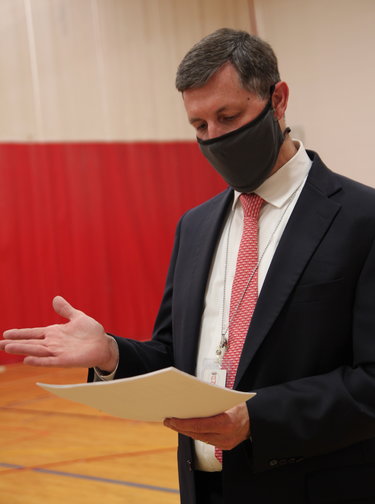Grassroots democracy proves to be the hardiest kind
It is easy these days to get discouraged about the state of our democracy.
Donald Trump is still lying about his loss in the 2020 presidential election and those who uphold his lies are, across the country, passing legislation that will limit voters’ rights.
The centerpiece of our democracy is the right for every citizen to vote. These have been hard-fought rights — for women, for Blacks, for many marginalized groups.
The smooth transition of power has been a hallmark of our country’s democracy. The Jan. 6 siege on the United States Capitol in the midst of the Electoral College votes being accepted should be recognized for what it is — an insurrection — and should unite us as citizens to work towards strengthening our democracy.
This past week, I had a moment of hope as I waited in the Guilderland Elementary School gym for the votes to be tallied from the school and library elections.
The polls closed at 9 p.m. and I waited for an hour-and-a-half with school and library leaders and candidates for both boards to hear the election results. I watched as clusters of people formed and reformed. Candidates who were running against each other — both board races were contested — conversed amiably as the minutes ticked by.
I was familiar with the varied views of school board candidates, having conducted issues-based interviews — videos for our online readers, written profiles for our print readers.
Yet I saw no animosity among them.
When the assistant superintendent for business, Neil Sanders, entered the gym at about 10:30 p.m., the separate clusters formed a semi-circle, facing Sanders. Everyone knew that he held the vote tallies in his hand, gathered from the five elementary-school polling places.
As Sanders read the news of the budgets — both for the school and the library — passing easily, there was united applause.
The group was largely silent as Sanders read the number of votes garnered by each candidate.
Once it was clear who the winners and losers were, I went first to talk to the young man, Luciano Alonzi, who had been ousted from his school board seat. He stood with his twin brother and with another young school board member. Alonzi was courteous and composed.
He had been elected last year, just as he was completing his college degree in athletic training. “I enjoyed my time on the board. I think I had a positive impact,” he said after hearing the results. Alonzi said he didn’t think he would run again soon as he would focus on employment. He still has work to finish on the board, he said.
Unlike our former president, he did not rant. He did not say the election had been stolen. He did not claim the numbers were false. He did not rally his supporters against those who had won.
The two incumbents on the library board were ousted as well. Throughout the week, we have not heard a word from either of them that the election was unfair.
At this most local level of government, the transition of power was seamless.
And that has given me hope for our democracy.
I thought about Alexis de Tocqueville, the French historian, who traveled to America in the early 19th Century, and wrote about the unique brand of American democracy, contrasting it to governments in Europe.
One truth about American democracy that Tocqueville documented was how local liberties and local self-government are more highly regarded than associations with states or the nation at large. Unlike in France, he wrote, each town forms its own sort of Republic, used to governing itself.
While today, with internet and television and radio, the nation is connected in ways never imagined by Tocqueville, we believe citizens still feel most effective in and most connected to their local domains.
And we saw last week, in Guilderland’s own little Republic, democracy working as it should.
The charge for each of us, then, as United States citizens, is to continue to nurture grassroots democracy. Primaries are coming next month. Read candidates’ views on our pages. Ask questions, seek answers. And vote.
But, beyond that, look to solidifying that foundational belief in democracy at the state and national levels, too.
“Among a democratic people, where there is no hereditary wealth, every man works to earn a living…,” Tocqueville wrote of America. “Labor is held in honor; the prejudice is not against but in its favor.”
Those of us who labor to earn a living need not cede our powers to the wealthy — it’s corporate wealth that threatens American democracy, not the inherited wealth Toqueville wrote of in Europe.
He, of course, saw industrialization, and rise of the middle class, as what made democracy possible. But at the same time, Tocqueville noted that the route of industry was the gate by which a newfound wealthy class might one day dominate.
“Friends of democracy must keep an anxious eye peeled in this direction at all times,” he wrote.
And so we must. But at least now we have hope that democracy can prevail.



